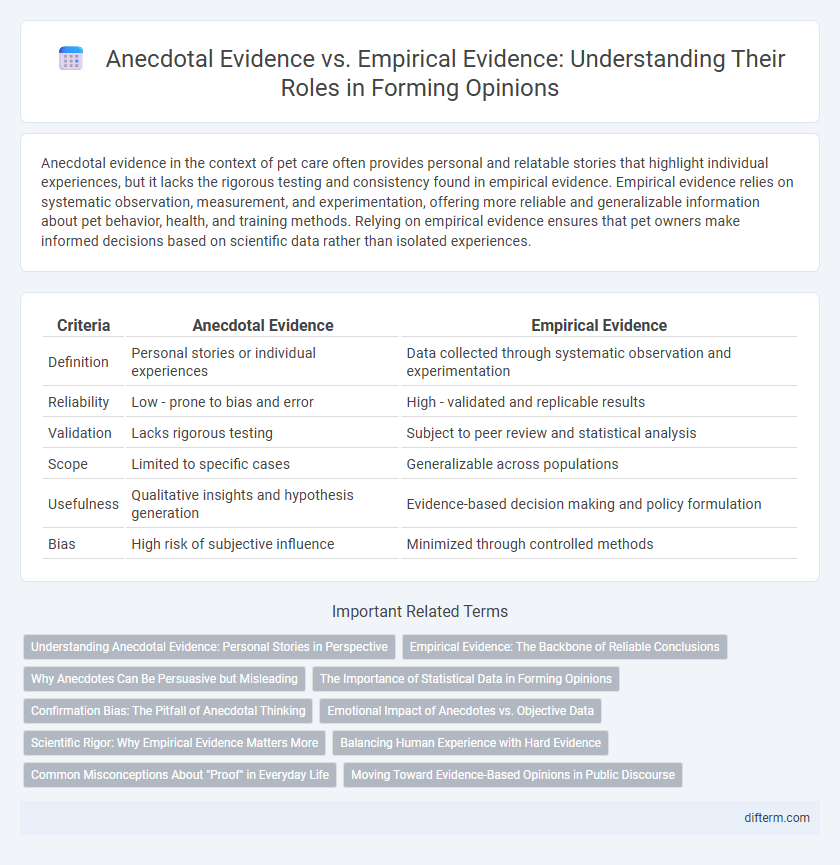Anecdotal evidence in the context of pet care often provides personal and relatable stories that highlight individual experiences, but it lacks the rigorous testing and consistency found in empirical evidence. Empirical evidence relies on systematic observation, measurement, and experimentation, offering more reliable and generalizable information about pet behavior, health, and training methods. Relying on empirical evidence ensures that pet owners make informed decisions based on scientific data rather than isolated experiences.
Table of Comparison
| Criteria | Anecdotal Evidence | Empirical Evidence |
|---|---|---|
| Definition | Personal stories or individual experiences | Data collected through systematic observation and experimentation |
| Reliability | Low - prone to bias and error | High - validated and replicable results |
| Validation | Lacks rigorous testing | Subject to peer review and statistical analysis |
| Scope | Limited to specific cases | Generalizable across populations |
| Usefulness | Qualitative insights and hypothesis generation | Evidence-based decision making and policy formulation |
| Bias | High risk of subjective influence | Minimized through controlled methods |
Understanding Anecdotal Evidence: Personal Stories in Perspective
Anecdotal evidence consists of personal stories that provide subjective insights but lack generalizability and rigorous validation. Empirical evidence relies on systematic observation, measurement, and experimentation, offering more reliable and reproducible data for informed decision-making. Understanding the limitations of anecdotal accounts helps prevent biases and supports a balanced interpretation of individual experiences within broader scientific contexts.
Empirical Evidence: The Backbone of Reliable Conclusions
Empirical evidence, grounded in systematic observation and experimentation, provides a robust foundation for drawing reliable conclusions. Unlike anecdotal evidence, which relies on personal stories and subjective experiences, empirical data undergoes rigorous testing and validation, ensuring objectivity and reproducibility. This scientific approach mitigates biases and enhances the credibility of findings across disciplines.
Why Anecdotes Can Be Persuasive but Misleading
Anecdotal evidence often resonates emotionally and is easier to remember, making it highly persuasive despite lacking scientific rigor. Its vivid and personal nature can create strong biases, overshadowing empirical evidence derived from systematic research and large data sets. Reliance on anecdotes can lead to misconceptions, as isolated incidents do not reflect broader trends or causality confirmed by statistical analysis.
The Importance of Statistical Data in Forming Opinions
Statistical data provides a robust foundation for forming opinions by offering quantifiable and reproducible evidence, unlike anecdotal evidence which is often subjective and limited in scope. Empirical evidence derived from controlled studies delivers insights that reduce cognitive biases and improve decision-making accuracy. Relying on well-analyzed statistical data ensures opinions are informed by patterns and probabilities rather than isolated, individual experiences.
Confirmation Bias: The Pitfall of Anecdotal Thinking
Confirmation bias often leads individuals to prioritize anecdotal evidence over empirical data, reinforcing pre-existing beliefs despite contradictory facts. This cognitive distortion skews perception, causing selective memory and interpretation of events that align with personal biases rather than objective reality. Reliance on anecdotal evidence undermines rigorous decision-making processes by ignoring statistically significant trends that empirical studies reveal.
Emotional Impact of Anecdotes vs. Objective Data
Anecdotal evidence often carries a strong emotional impact, making stories more memorable and persuasive due to personal connections and vivid details. Empirical evidence, grounded in systematic research and objective data, provides reliable and generalized conclusions but may lack the immediate emotional appeal. Understanding this contrast highlights why individuals sometimes favor emotionally charged anecdotes over statistically valid information in decision-making processes.
Scientific Rigor: Why Empirical Evidence Matters More
Empirical evidence, grounded in systematic observation and experimentation, ensures scientific rigor by minimizing bias and enhancing reproducibility, unlike anecdotal evidence which relies on personal experiences and lacks generalizability. Studies published in peer-reviewed journals consistently emphasize the importance of controlled variables and statistical analysis to validate hypotheses. This methodological robustness is crucial for advancing knowledge and informing evidence-based practices across disciplines.
Balancing Human Experience with Hard Evidence
Anecdotal evidence captures personal experiences that offer valuable insights into human behavior and emotions, reflecting real-world complexities often missed in controlled studies. Empirical evidence, grounded in systematic observation and experimentation, provides reliable data essential for forming objective conclusions and policy decisions. Balancing these approaches ensures a holistic understanding, where human narratives enrich scientific findings without compromising rigor.
Common Misconceptions About "Proof" in Everyday Life
Anecdotal evidence often creates a false sense of proof due to vivid personal stories that resonate emotionally, yet it lacks the rigorous controls and reproducibility found in empirical evidence. People frequently mistake repeated anecdotes for legitimate proof, ignoring the statistical validity and systematic observation that empirical data provides. This misconception hampers critical thinking by prioritizing individual experiences over scientifically gathered evidence crucial for reliable conclusions.
Moving Toward Evidence-Based Opinions in Public Discourse
Anecdotal evidence, while compelling and relatable, often lacks the rigor and representativeness required for sound public discourse, leading to biased or incomplete conclusions. Empirical evidence, grounded in systematic observation and experimentation, provides a more reliable foundation for forming opinions and guiding policy decisions. Moving toward evidence-based opinions enhances the quality of debates, promotes informed decision-making, and fosters trust in both experts and institutions.
anecdotal evidence vs empirical evidence Infographic

 difterm.com
difterm.com